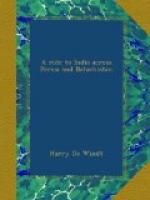“There is no road from Astara,” said Z——, “and deep rivers to cross. You will be robbed and murdered like the Italian who travelled this way three years ago! He was the last European to do so.”
Gerome remembers the incident. In fact, he says, the murdered man was a friend of his, travelling to Teheran with a large sum of money. Unable to land at Resht, and impatient to reach his destination, he took the unfrequented route, was waylaid, robbed, tied to a tree, and left to starve. “He was alone and unarmed, though,” says my companion; adding with a wink, “Let them try it on with us!”
Seeing remonstrance is useless, Z—— wishes us God-speed. The good-natured Swede presses a box of Russian cigarettes into my hand as I descend the ladder—a gift he can ill afford—and twenty minutes later our boat glides safely and smoothly on Persian soil.
It was a lovely day, and the blue sky and sunshine, singing of birds, and green of plain and forest, a pleasant relief to the eye and senses after the cold and misery of the past two days. Astara (though the port of Tabriz) is an insignificant place, its sole importance lying in the fact that it is a frontier town. On one side of the narrow river a collection of ramshackle mud huts, neglected gardens, foul smells, beggars, and dogs—Persia; on the other, a score of neat stone houses, well-kept roads and paths, flower-gardens, orchards, a pretty church, and white fort surrounded by the inevitable black-and-white sentry-boxes, guarded by a company of white-capped Cossacks—Russia. I could not help realizing, on landing at Astara, the huge area of this vast empire. How many thousand miles now separated me from the last border town of the Great White Czar that I visited—Kiakhta, on the Russo-Chinese frontier?
Surrounded by a ragged mob, we walked to the village to see about horses and a lodging for the night. The latter was soon found—a flat-roofed mud hut about thirty feet square, devoid of chimney or furniture of any kind. The floor, cracked in several places, was crawling with vermin, and the walls undermined with rat-holes; but in Persia one must not be particular. Leaving our baggage in the care of one “Hassan,” a bright-eyed, intelligent-looking lad, and instructing him to prepare a meal, we made for the bazaar, a hundred yards away, through a morass, knee deep in mud and abomination of all kinds, to procure food.
A row of thirty or forty mud huts composed the “bazaar,” where, having succeeded in purchasing tea, bread, eggs, and caviar, we turned our attention to horseflesh.




